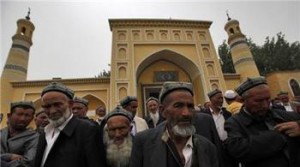China authorities ban Islamic names, threatened to bar
ABNA24, 29 September 2015
 Ahlul Bayt News Agency – Chinese authorities have banned many Muslim names in China’s northwestern district of Xinjiang and threatened to bar students with such names from attending schools, in the latest crack down on Uighurs’ religious rights.
Ahlul Bayt News Agency – Chinese authorities have banned many Muslim names in China’s northwestern district of Xinjiang and threatened to bar students with such names from attending schools, in the latest crack down on Uighurs’ religious rights.
“My daughter’s name is Muslime, so the village police came to our house and told us that we must change our daughter’s name as soon as possible,” Uighur woman named Turakhan told Radio Free Asia.
“The police explained to us that a name such as Muslime was officially forbidden. Under such circumstances, we were forced to change our daughter’s name.”
The Muslim woman was recounting how she was asked to change her daughter’s Muslim name which became banned in Xinjiang’s Hoten prefecture.
“It is the decision of the township and village authorities. Don’t ask any foolish questions,” the police also told Turakhan.
Some 22 Muslim names, including 15 names for males, were mentioned in the region’s “list of forbidden Muslim names,” in a bid to counter “extremism” in the Muslim dominant region.
An official announcement said that Muslim names like Bin Laden, Saddam, Hussein, Arafat, Mujahid, Mujahidulla, Asadulla, Abdul’aziz, Seyfulla, Guldulla, Seyfiddin, Zikrulla, Nesrulla, Shemshiddin and Pakhirdin are banned.
Amanet, Muslime, Mukhlise, Munise, Aishe, Fatima, Khadicha [Khadija] are the seven banned female names.
Muslim residents and imams were informed about the list by the head of the Political and Law Enforcement Office at the Township Party Committee.
“Village party secretaries or village police have already informed the imams that they must obey the township authority’s restriction on some Islamic names,” the policeman said.
“So in the Hoten region, everybody, including the imams and residents, know which names are legal and which names are forbidden.”
Muslims children with forbidden names are threatened of not being allowed attending kindergarten and elementary school, according to residents.
Condemnation
Banning Muslim names in Xinjiang has been condemned by Uighur leaders who called it a “foolish decision.”
“Giving children religious or ethnic names is a basic human right,” Ilshat Hesen, vice president of the Washington-based Uyghur American Association, said.
“Even in China’s constitution and regional ethnic autonomy laws, there exists no such forbidding of names.”
He added that some high-ranking, pro-China and pro-communist Uighur officials have had typical Muslim names, such as Seyfiddin Azizi, Isma’il Ahmed, Nur Bakri, since the Chinese revolution in 1949.
“More than 80 percent of Uighur traditional names are Islamic names that come directly from the Qur’an and other Islamic texts,” he noted.
“There have been no authorities or governments in China’s history, including the Manchu Qing Dynasty or nationalist government, which have forbidden Uyghur names.”
Last Ramadan, some parts of the far western Xinjiang district banned Muslim party members, civil servants, students and teachers from fasting during the holy month.
Earlier in December, China banned the wearing of Islamic veiled robes in public in Urumqi, the capital of the province of Xinjiang.
The law in the predominantly Muslim region came as Beijing intensified its so-called campaign against “religious extremism” that it blames for recent violence.
Earlier in 2014, Xinjiang banned the practicing of religion in government buildings, as well as wearing clothes or logos associated with religious extremism.
Last May, Muslim shops and restaurants in a Chinese village in northwestern Xinjiang were ordered to sell cigarettes and alcohol or face closure.
http://en.abna24.com/service/centeral-asia-subcontinent/archive/2015/09/28/712713/story.html

